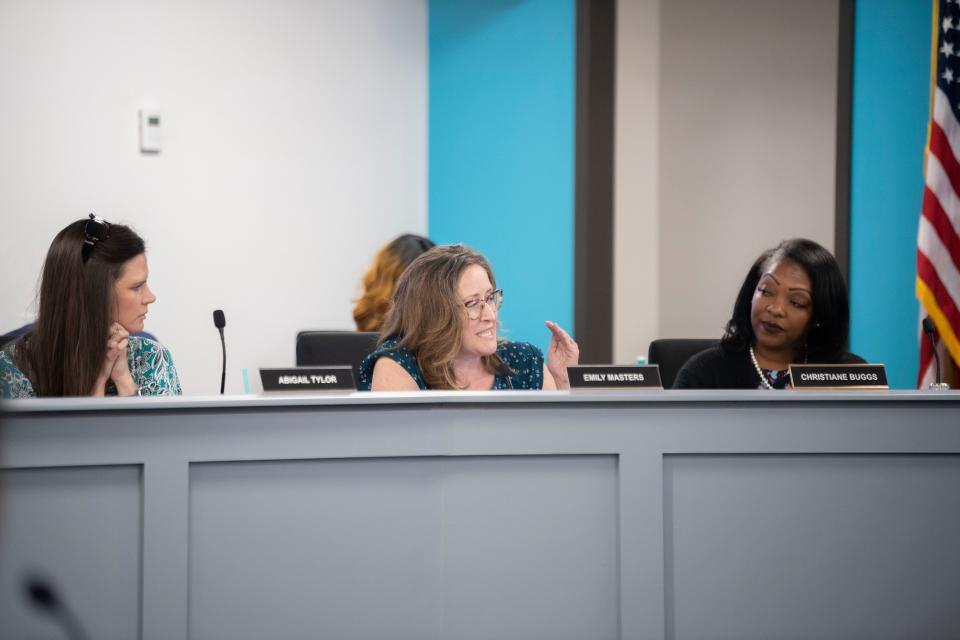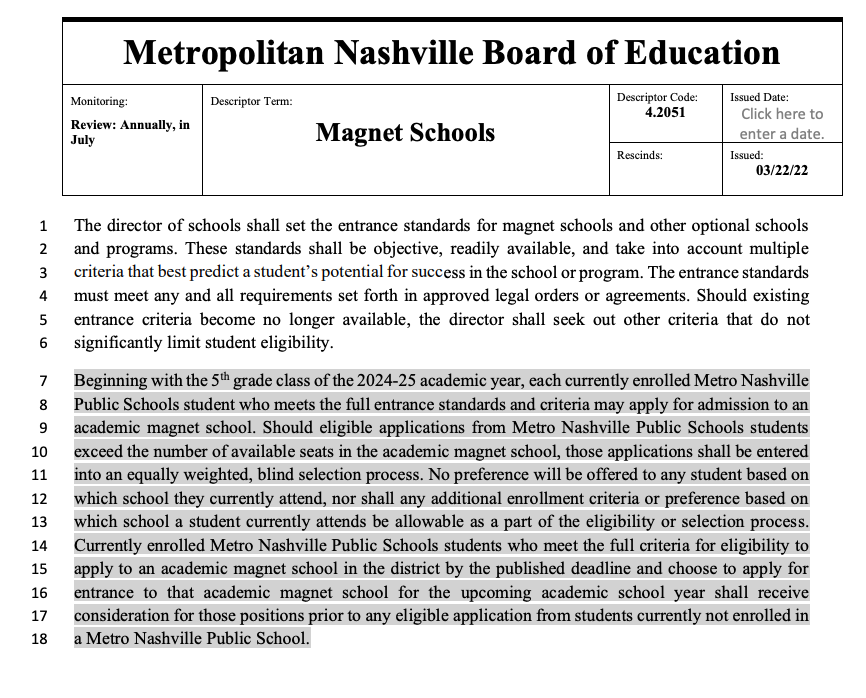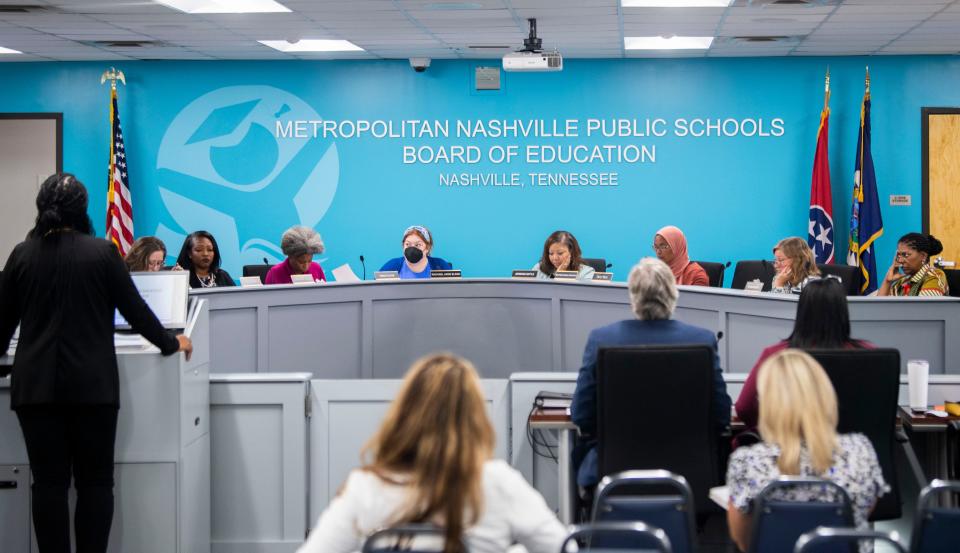Nashville school board considers expanding magnet school lottery, seeks community input
A proposed change would expand Nashville's academic magnet schools lottery to all students who qualify — a move that would eliminate pathways that help students secure spots in two highly sought-after magnet high schools.
Metro Nashville Public Schools Board Member Emily Masters said the change, which she proposed, is intended to boost diversity.
While this topic is not new to MNPS, it was most recently discussed at an Aug. 29 school board retreat and again taken up during the board's governance committee meeting Tuesday evening. Masters led both discussions.

As proposed, the policy would eliminate preference given to qualified students from four magnet middle schools as they vie for a spot at either Hume-Fogg Magnet High School or Martin Luther King Jr. Magnet School, which offers grades 7-12.
That means all qualified students who apply would be subject to the lottery-style selection process for a seat that applies to most of the district's magnet schools. The change would take effect during for the fifth grade class starting in the 2024-25 school year.

Based on concerns, questions and pushback board members received from parents and school leaders, they agreed Tuesday to defer the topic indefinitely. Masters said she hopes that opens up "robust conversation" with parents, educators and the larger MNPS community about rethinking the magnet process.
Here's what you need to know about how the district's magnet schools function, what was discussed and what's next.
How Nashville's academic magnet schools work
MNPS has eight magnet elementary schools, eight magnet middle schools and five magnet high schools, according to its website. The schools are designed to attract students with innovative programs and unique curriculum focused on sciences, the arts, language, International Baccalaureate and more.
Along with offering focused academics and a variety of programs, the magnet schools also work to build diverse student bodies.
"Soft skills, teamwork, acceptance and engagement make magnet schools a vibrant academic environment," the MNPS website reads. "Students engage in real-life preparation, interacting with peers from all backgrounds, and gaining hands-on experience working with businesses, cultural institutions, universities and community organizations in Nashville."
Magnet schools were first established in the 1960s and 1970s to promote voluntary desegregation by attracting racially diverse populations with thematic instruction, according to a 2021 report from the University of California, Los Angeles.
All of the district's magnet schools require an application, but four have additional rigorous academic and testing requirements to enroll. Those include:
Meigs Middle School (grades 5-8)
Martin Luther King Jr. Magnet School (grades 7-12)
Hume-Fogg Academic High School (grades 9-12)
Early College High School (grades 9-12)
Currently, Meigs Middle School and John Early Middle School serve as pathway schools to Hume-Fogg, while Head Middle School and Rose Park Middle School serve as pathways to MLK. Around 1,800 students enrolled across those four pathway middle schools for the 2022-23 school year, statistics from the MNPS Open Data Portal show. Another 270 are currently in 7th and 8th grade at MLK.
Both MLK and Hume-Fogg are among the top performers in the district and statewide. Hume-Fogg was also recently ranked in US News & World Report's top 100 public high schools in the country. MLK was ranked at #219 on the list, which contains nearly 18,000 traditional, magnet, charter and STEM schools.
Learn more about the district's magnet school offerings, including a list of all the schools, steps to apply and requirements, at mnps.org/learn/academics/magnet_schools.
2023-2024 best high schools rankings: Three Nashville-area schools made the top 100
Why was the change proposed?
Masters said her proposal was inspired by a lack of diversity at Meigs, Hume-Fogg and MLK that does not reflect MNPS as a whole. On Tuesday, she referenced previous discussions dating back several years on how to boost diversity in the two schools.

When it comes to grades 9-12, Masters said a disproportionate number of the district's Asian and white students attend either MLK or Hume-Fogg. Here's how those numbers break down:
22% of the district's Asian high school students go to either MLK or Hume-Fogg
17% of the district's white high school students go to either MLK or Hume-Fogg
0.06% of the district's Black high school students go to either MLK or Hume-Fogg
0.02% of the district's Hispanic or Latino high school students go to either MLK or Hume-Fogg
Masters also gathered MNPS data that she shared with the rest of the board in an email sent Monday.
It showed most of the 2022-23 freshman class at Hume-Fogg came from Meigs Middle, while most seventh graders at MLK came from Head Middle. For those starting high school at MLK, around 32% came from schools that were in Davidson County but not part of MNPS. A handful of MLK freshmen came from either Head Middle or Rose Park Middle.
It was not clear how many freshmen at MLK were from the school's eighth grade class.
Here are some other key takeaways from the numbers Masters provided, which reflect the 2022-23 school year:
Grades 5-8 at Meigs Middle School have a much lower percentage of students with disabilities, along with those who are economically disadvantaged or are limited in English proficiency, compared to MNPS as a whole.
Grades 5-8 at Meigs Middle School have a much higher percentage of white and Asian students compared to MNPS as a whole, but a much lower percentage of Black, Hispanic or Latino students.
Grades 7-12 at MLK have a much lower percentage of students with disabilities, along with those who are economically disadvantaged or are limited in English proficiency, compared to MNPS as a whole. Those same comparisons are roughly the same for grades 9-12 at MLK and Hume-Fogg.
Grades 7-12 at MLK have a similar percentage of Black students compared to MNPS as a whole, but far more white and Asian students. It also has a much smaller percentage of Hispanic or Latino students than the district overall. Those same comparisons are roughly the same for grades 9-12 at MLK.
Grades 9-12 at Hume-Fogg have a much higher percentage of white and Asian students compared to MNPS as a whole, but a much lower percentage of Black, Hispanic or Latino students.
Masters agreed with her colleagues that a more nuanced discussion with space for public input is needed to solve the diversity issues she cited. She also spoke to concerns that the board was trying to make a secretive or unilateral move to change the magnet school policy without giving parents, teachers or others notice or time to offer feedback.
She said presenting a policy change in a committee meeting is the only way to start a conversation about it.
"We’re not sitting around in secret coming up with these policies," Masters said. “This is the way we create the jumping off point.”
What's next
The committee unanimously agreed to remove a vote on the magnet school policy change from the agenda for its regular meeting Tuesday, which directly followed the committee meeting.
Conversations about magnet schools and possible policy changes will now be up to each board member to hold in community meetings. People can also voice questions or concerns directly to board members.
“Folks have said there’s not been any community engagement," District 6 Board Member Cheryl Mayes said. "Here’s your chance."
Find more details about the Board of Education, including a list of members and upcoming meeting agendas, at mnps.org/board-of-education.
This article originally appeared on Nashville Tennessean: Nashville schools seek input on expanding magnet school lottery

